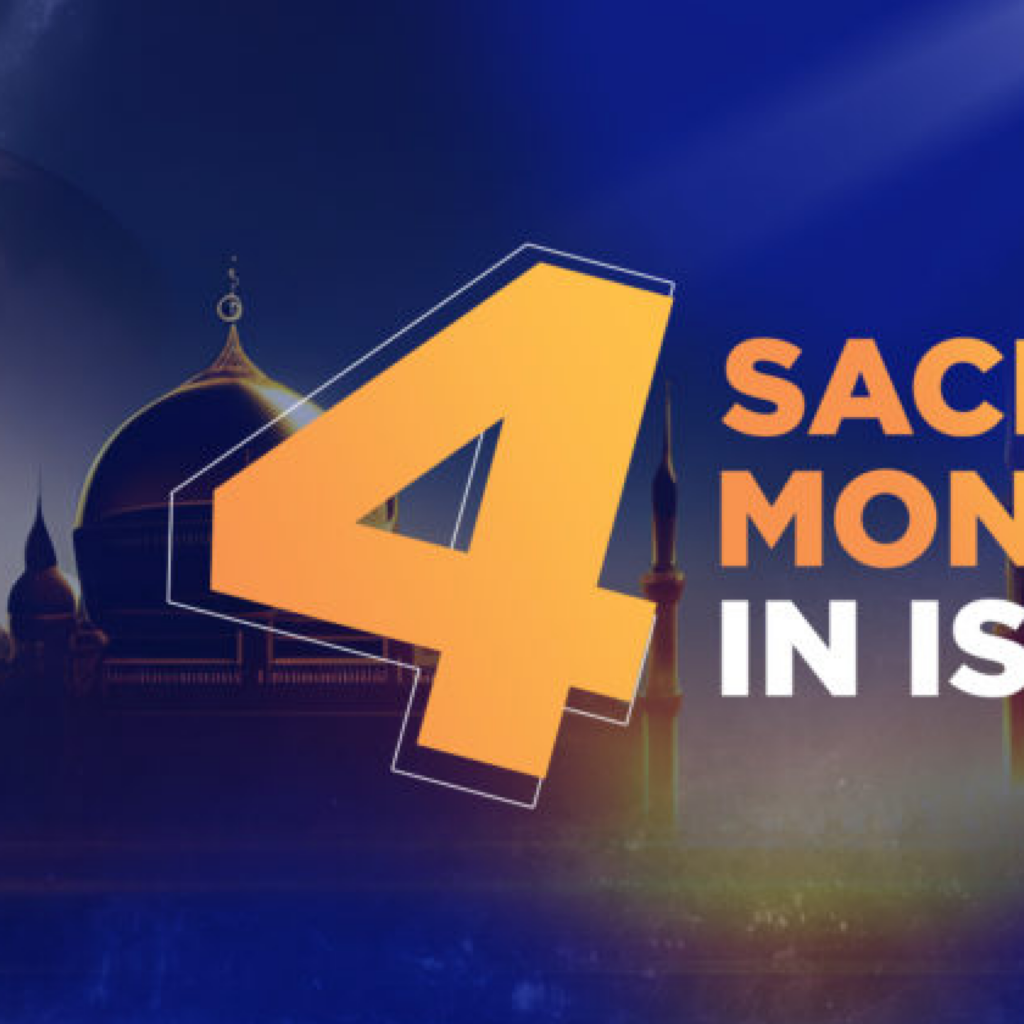The 4 sacred months in islam are a set of four months in the Islamic calendar that are given special sanctity by Allah.
These months are an excellent opportunity for Muslims to get closer to Allah through good deeds and avoiding sins.
Below is a detailed description of these blessed months, their virtues, and how to honor them.

What Are the 4 sacred months in islam?
The sacred months are four months in the lunar calendar that Allah has made sacred and honorable. They are:
- Dhul-Qi’dah: The eleventh month of the Islamic year. It is a month in which war is prohibited, and people prepare for pilgrimage.
- Dhul-Hijjah: The twelfth month, during which the Hajj pilgrimage takes place.
- Muharram: The first month of the Islamic year, known as “The Sacred Month of Allah,” with great virtue.
- Rajab: The seventh month, a separate month between Jumada al-Thani and Sha’ban.
Allah says:
(إِنَّ عِدَّةَ الشُّهُورِ عِندَ اللَّهِ اثْنَا عَشَرَ شَهْرًا فِي كِتَابِ اللَّهِ يَوْمَ خَلَقَ السَّمَاوَاتِ وَالْأَرْضَ مِنْهَا أَرْبَعَةٌ حُرُمٌ) [التوبة: 36].

Why Are These 4 sacred months in islam?
- Prohibition of Fighting in Them: Allah forbids fighting in these months, except in cases of self-defense.
- Promoting Peace and Security: The purpose of prohibiting fighting in these months is to foster security and peace among people.
- Increased Sanctity of Oppression: Allah has emphasized the severity of oppression in these months, saying:
(فَلَا تَظْلِمُوا فِيهِنَّ أَنفُسَكُمْ).

Virtues of the Sacred Months
1. Allah Swears by Them
Allah swears by the first ten days of Dhul-Hijjah, which is one of the sacred months, in His words: (وَالْفَجْرِ وَلَيَالٍ عَشْرٍ). This is a sign of their greatness and importance.
2. Multiplication of Reward
Good deeds performed in these months are rewarded with multiplied rewards, and committing sins is greatly magnified. Therefore, Muslims are encouraged to stay away from sin during this time.
3. Performing Hajj
Dhul-Hijjah, one of the sacred months, is the month of Hajj, which is one of the most significant acts of worship for Muslims.
4. Virtue of Fasting
Fasting during the sacred months is recommended, particularly in Muharram. The Prophet (peace be upon him) said:
“The best fast after Ramadan is the fast of the month of Allah, Muharram.”
5. The Day of Ashura
Fasting on the Day of Ashura in Muharram expiates the sins of the previous year. It is the day Allah saved Prophet Musa (Moses) and his followers from Pharaoh.
6. Reminder of Divine Wisdom
Allah has designated these months for sacred purposes to remind His servants of the importance of organizing their lives in accordance with His commands.
7. Promoting Unity and Piety
The prohibition of fighting in these months encourages peace and unity among Muslims, fostering cooperation and piety.

Recommended Actions in the Sacred Months
1. Increasing Worship
- Fasting: It is encouraged to fast on certain days of these months, especially on the 9th and 10th of Muharram.
- Prayer: Focus on extra prayers and night prayers (Qiyam al-Lail).
- Dhikr and Seeking Forgiveness: Engage in continuous remembrance of Allah and seeking forgiveness.
2. Doing Good to Others
- Strengthening family ties and community relations.
- Helping the needy.
- Spreading peace and love among people.
3. Seeking Knowledge
Take advantage of these months to learn and spread Islamic knowledge.
4. Avoiding Sin
Avoid any form of sin, as sins committed during these months are considered more severe.

Prohibited Actions in the Sacred Months
1. Oppression
Oppression of any kind is forbidden during these months. Whether it is oppression of oneself through sins or oppression of others through injustice.
2. Fighting
Fighting is prohibited, except in cases of self-defense, as Allah says:
(يَسْأَلُونَكَ عَنِ الشَّهْرِ الْحَرَامِ قِتَالٍ فِيهِ قُلْ قِتَالٌ فِيهِ كَبِيرٌ) [البقرة: 217].
3. Hunting While in a State of Ihram
It is forbidden for a person in the state of Ihram (for Hajj or Umrah) to hunt or aid in hunting.
4. Disrespecting Their Sanctity
Disregarding the sanctity of these months and being careless in one’s actions is a violation of Allah’s commands.

The Concept of An-Nasee’ (Postponing the Sacred Month)
An-Nasee’ is the practice in pre-Islamic Arabia where the sacred months were manipulated by postponing one to allow for fighting in another month. Allah condemns this practice in the Qur’an:
(إِنَّمَا النَّسِيءُ زِيَادَةٌ فِي الْكُفْرِ) [التوبة: 37].
This practice was abolished in Islam to preserve the integrity and sanctity of the sacred months and to emphasize the importance of adhering to the prescribed times.

How to Honor the Sacred Months
- Increase Piety and Good Deeds: Strive to do acts of kindness and righteousness, especially those that honor Allah’s commands.
- Avoid Oppression: Refrain from injustice towards yourself and others.
- Stay Away from Sin: Be extra cautious, as the consequences of sins in these months are greater.
- Revive the Sunnah of the Prophet: Engage in acts of worship, such as the night prayer (Tahajjud) and other recommended deeds.
- Strengthen Family and Community Bonds: Use these months to nurture family ties and improve relationships with neighbors and friends.

Historical Events that Took Place in the Sacred Months
- The Year of the Elephant: The attack on the Ka’bah by Abraha in Muharram, one of the sacred months. Allah revealed Surah Al-Fil to commemorate this event.
- The Final Hajj: The Prophet’s last pilgrimage occurred in Dhul-Hijjah, during which he shared his renowned sermon filled with valuable guidance and teachings.
- The Battle of Mu’tah: This conflict took place in one of the revered months, signifying an important political shift in the formative period of Islam.

The Impact of Observing the Sacred Months on Individuals and Society
On the Individual
- Strengthens the bond between the servant and Allah.
- Increases the desire to perform acts of worship and avoid sins.
- Provides an opportunity for self-reflection and self-improvement.
On Society
- Promotes values of peace, tolerance, and forgiveness.
- Reduces conflicts and promotes unity.
- Encourages social cohesion and reliance on Allah.

Conclusion
The sacred months are not just periods in the Islamic calendar, but they represent a significant opportunity to draw nearer to Allah, reflect on one’s actions, and spread peace and kindness. Make the most of these months to strengthen your relationship with Allah and improve your community.
Descriptive Summary:
“The sacred months provide a great opportunity to honor the commands of Allah and strengthen our relationship with Him through good deeds and reflection. Learn how to honor these months and maximize their spiritual benefits.”
At Quranic Mind, we strive to help you deepen your understanding of Islam and enhance your worship. Follow us for more guidance on how to improve your faith and devotion.
Resources

